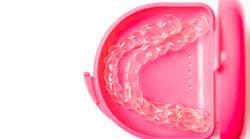Dentistry continues to change at a fast rate, and no specialty is transforming faster than orthodontics. Clear aligner therapy, led by Invisalign, has been and continues to spur huge growth in the adult orthodontic market.
SmileDirectClub (SDC) is one example of a company that has entered the marketplace labeling itself a disrupter of the orthodontics industry. The company offers a teledentistry business model that allows patients to receive clear aligners by mail. Patients can choose to have either a free 3-D image of their teeth taken at a “Smile Shop,” or they can purchase a kit online, take their own impressions, and mail the impressions to SmileDirectClub. The company then manufactures and ships the clear aligners back to patients, who typically undergo treatment over a five- to 10-month period.
The company’s approach claims that their treatment requires no office examination by a dentist or orthodontist. This has understandably ignited much controversy, since a thorough exam is needed prior to undergoing any type of dental procedure, including orthodontics.
During its five years in existence, SDC has received more than 1,200 Better Business Bureau (BBB) complaints, and some of its practices have been deemed illegal by dental boards in Alabama and Georgia.1 Furthermore, the American Dental Association and the American Association of Orthodontics have alleged that SmileDirectClub is endangering patients and practicing medicine illegally.2
Additionally, employee reviews on glassdoor.com portray an aggressive sales culture, leading to inappropriate and dangerous approvals at the Smile Shops. Employees have 30 minutes to “sell a new smile” to each customer and are required to close deals with at least 70% of potential clients.3
Rather than attempting to improve its practices or address these complaints, SDC has launched an aggressive litigation campaign. It forces dissatisfied patients to sign legal releases, which state they promise not to complain to regulators or write negative online reviews, in order to obtain refunds.4
In response to these concerns, California recently passed legislation that provides new protections for direct-to-consumer orthodontic patients, which becomes effective January 1, 2020.5
This first-of-its-kind legislation creates an equality in the standard of care, whether a dentist is treating a patient in a dental office or via telehealth. Regulations require that dentists providing orthodontic treatment meet the basic accepted standard of care by reviewing a patient’s recent x-rays prior to any movement of teeth. Telehealth companies will also be required to provide patients with basic information about their treating dentist. The legislation provides consumers with the ability to submit complaints about licensees to the state dental board, even if a patient has signed an arbitration clause or nondisclosure agreement.
Providing dental care to patients, especially moving teeth, without sufficient diagnostic information can potentially lead to serious patient harm, including loose or cracked teeth, gum recession, and tooth loss. With emerging business models offering various dental services outside of an office’s four walls, including direct-to-consumer orthodontic services, it’s imperative that all dental treatment meets the same standard of care.
Patients, or prospective patients, who are contemplating direct-to-consumer treatment should be informed of these facts so that they are educated before finalizing a treatment decision.
References
1. Need to file a complaint? Better Business Bureau website. https://www.bbb.org/us/tn/nashville/profile/cosmetic-dentistry/smiledirectclub-0573-37111672/complaints.
2. Association files complaint with FTC, FDA, against SmileDirectClub. ADA website. https://www.ada.org/en/publications/ada-news/2019-archive/july/association-files-complaint-with-ftc-fda-against-smiledirect-club.
3. SmileDirectClub reviews. Glassdoor website. https://www.glassdoor.com/Reviews/Smile-Direct-Club-Reviews-E1043560_P5.htm. Accessed November 13, 2019.
4. SmileDirectClub: Moving fast and breaking things in people’s mouths—85% downside. Hindenburg Research website. https://hindenburgresearch.com/smiledirectclub-moving-fast-and-breaking-things-in-peoples-mouths/. Published October 4, 2019.
5. California passes dental law regarding self-applied orthodontic treatments. PR Newswire website. https://www.prnewswire.com/news-releases/california-passes-dental-law-regarding-self-applied-orthodontic-treatments-300940881.html. Published October 17, 2019.
JOHN K. McGILL, JD, MBA, CPA, provides tax and business planning for dentists and specialists, and publishes The McGill Advisory newsletter through John K. McGill & Company Inc., a member of the McGill & Hill Group LLC. The group is your one-stop resource for tax and business planning, practice transition, legal, retirement planning administration, CPA, and investment advisory services. Visit mcgillhillgroup.com.







